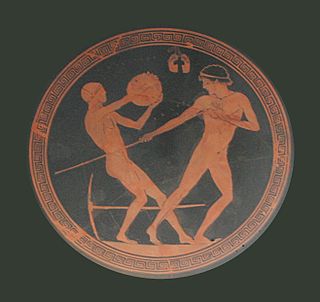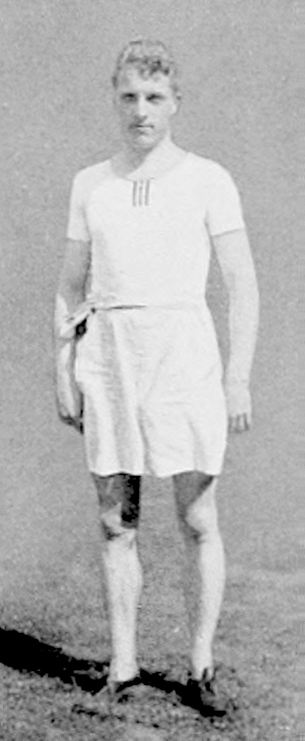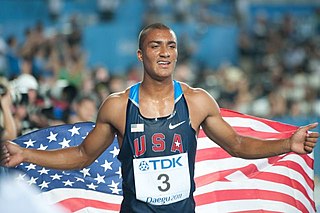
The decathlon is a combined event in athletics consisting of 10 track and field events. The word "decathlon" was formed, in analogy to the word "pentathlon", from Greek δέκα and ἄθλος. Events are held over two consecutive days and the winners are determined by the combined performance in all. Performance is judged on a points system in each event, not by the position achieved. The decathlon is contested mainly by male athletes, while female athletes typically compete in the heptathlon.

A pentathlon is a contest featuring five events. The name is derived from Greek: combining the words pente (five) and -athlon (competition). The first pentathlon was documented in Ancient Greece and was part of the Ancient Olympic Games. Five events were contested over one day for the Ancient Olympic pentathlon, starting with the long jump, javelin throwing, and discus throwing, followed by the stadion and wrestling. Pentathletes were considered to be among the most skilled athletes, and their training was often part of military service—each of the five events in the pentathlon was thought to be useful in war or battle.

Athletics has been contested at every Summer Olympics since the birth of the modern Olympic movement at the 1896 Summer Olympics. The athletics program traces its earliest roots to events used in the ancient Greek Olympics. The modern program includes track and field events, road running events, and race walking events. Cross country running was also on the program in earlier editions but it was dropped after the 1924 Summer Olympics.

Akilles "Aki" Eero Johannes Järvinen was a Finnish decathlete. He competed at the 1928, 1932 and 1936 Olympics and won two silver medals, in 1928 and 1932; he served as the Finnish flag bearer at all three games. He also won a European silver medal in the 400 m hurdles in 1934.
Matti Manu Ilmari Yrjölä is a 192 cm tall Finnish shot putter, who represented Kyröskosken Ponsi and weighed 121 kg when competing. He was the second Finn to put the shot more than 20 m in an official competition when he put it 20.04 metres in Hämeenkyrö, Finland on August 2, 1972.

Ferdinand Reinhardt Bie was a Norwegian track and field athlete. At the 1912 Summer Olympics in Stockholm he won the silver medal in pentathlon. On winner Jim Thorpe's subsequent disqualification for having played semi-professional baseball in 1913, Bie was declared Olympic champion, but refused to accept the gold medal from the IOC. In 1982 Thorpe was reinstated as champion by the IOC; however, Bie was still listed as co-champion until the IOC announced 15 July 2022 that Thorpe's gold medal had been reinstated and Bie became the silver medalist.
The men's decathlon competition at the 2005 World Championships in Athletics was held at the Helsinki Olympic Stadium on Tuesday 9 August and Wednesday 10 August.
The Men's Decathlon at the 2000 Summer Olympics as part of the athletics program was held at the Stadium Australia on Wednesday 27 September and Thursday 28 September 2000.
These are the official results of the Men's Decathlon competition at the 1988 Summer Olympics in Seoul, South Korea. There were a total number of 39 participating athletes, with five competitors who didn't finish the competition.

Ashton James Eaton is a retired American decathlete and two-time Olympic champion, who holds the world record in the indoor heptathlon event. Eaton was the second decathlete to break the 9,000-point barrier in the decathlon, with 9,039 points, a score he bettered on August 29, 2015, when he beat his own world record with a score of 9,045 points, and remains the only person to exceed 9000 points twice. His world record was broken by Frenchman Kevin Mayer on September 16, 2018, with a total of 9,126 points, who became the third man to pass the 9,000-point barrier.
Nikolay Sergeyevich Averyanov is a decathlete from Russia, who competed for his native country at the 2004 Summer Olympics in Athens, Greece. He set his personal best score in Tula on 24 June 2004.

The men's 1500 metre event at the 1928 Olympic Games took place between August 1 & August 2. Forty-four athletes from 19 nations competed. NOCs were limited to 4 competitors each. The event was won by Harri Larva of Finland, the nation's second consecutive victory in the 1500 metres. France won its first medal in the event since 1900, with Jules Ladoumègue's silver matching the nation's best result.

Jože Brodnik is a Slovenian retired decathlete who competed in the 1960 Summer Olympics representing Yugoslavia.

Kai Kazmirek is a German track and field athlete who competes in the decathlon. He holds a personal best of 8580 points for the event achieved in Rio 2016, as well as an indoor heptathlon best of 6173 points. He is a member of LG Rhein-Wied athletics club.

Bror Henry Lindblad was a Swedish pole vaulter and decathlete. The first Swede to vault four metres or more, he was Swedish pole vault champion seven times and AAA champion three times. At the 1928 Summer Olympics in Amsterdam he competed in the pole vault and decathlon, finishing in the top ten in both events.

Combined events at the Summer Olympics have been contested in several formats at the multi-sport event. There are two combined track and field events in the current Olympic athletics programme: a men's decathlon and a women's heptathlon.

The men's decathlon competition at the 2016 Summer Olympics in Rio de Janeiro, Brazil. The event was held at the Olympic Stadium between 17 and 18 August.

Eläintarha Stadium is a multi-purpose stadium at the Eläintarha park in Helsinki, Finland. It was opened in 1910 as the first stadium in Helsinki. Today it is mostly used by track and field athletes.
The 1928 United States Olympic trials for track and field were held between July 3 and July 7, 1928 and decided the United States team for the 1928 Summer Olympics in Amsterdam. For the first time, women's track and field was part of the Olympic program. The trials for men and women were held separately; men competed at Harvard Stadium in Cambridge, Massachusetts on July 6 and July 7, while women competed at City Field in Newark, New Jersey on July 4. Three of the men's events were contested in Philadelphia, Pennsylvania between July 3 and July 5.

Pierce LePage is a Canadian track athlete who competes in the decathlon. He is the 2023 World champion, and the first Canadian to win the decathlon title at the World Athletics Championships. LePage is also the 2022 World silver medalist, 2018 Commonwealth silver medallist, and 2019 Pan American bronze medallist. LePage represented Canada at the 2020 Summer Olympics, finishing in fifth place.













